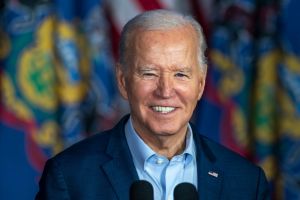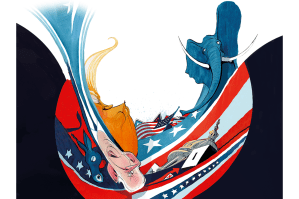In the clusters of billboards at intersections in Phoenix, positioned to grab the attention of drivers waiting for the lights to change, one candidate’s signs stand out. In a familiar red-white-and-blue collage of names, stars and stripes, the crisp bold-type white lettering on a black background reads: “BLAKE MASTERS FOR SENATE.”
The monochrome placards are one of many conspicuous displays of disruption by Masters, the thirty-six-year-old Peter Thiel acolyte hoping to topple Arizona Democrat Mark Kelly. The video with which he launched his campaign last summer was starkly shot and melancholic: the Sonora desert at dawn and a synth-y soundtrack, not the in-your-face, truck commercial aesthetic that is par for the course on the right these days. Masters is not just set on winning a Senate seat in Arizona, but also proving the appeal of his distinct flavor of Republicanism. That flavor isn’t just a Silicon Valley move-fast-and-break-things sensibility; it’s also a substantive critique of establishment Republican politics, a conviction that the current generation of conservative leaders have been too weak, too defensive and too ideologically narrow.
Along with J.D. Vance, Masters is one of the poster boys of the New Right. If he succeeds this week (and the polls suggest it will be a nail-biter), the gangly tech bro-turned-politician will become the youngest Republican in the Senate. Together, Masters, Vance (if the polls are right and he wins in Ohio) and Missouri senator Josh Hawley will form an intriguing, unpredictable and closely watched millennial bloc in Republican Party’s Senate caucus. Together, they represent a bookish version of MAGA: their claim about the populist moment is that it is more substance than style. Even as the former president seems increasingly interested in his own eccentric hang ups, their bet is that Trumpism is first and foremost about a set of policies — on trade, immigration, foreign policy, Big Tech and more — rather than just a stylistic pose, a disposition or a fan club.
When I spoke to Masters this summer, in the lobby of a Phoenix hotel after a campaign event, he was relaxed about what label to put on his politics and in a reconciliatory mood when it came to the old guard. “I don’t mind the term ‘New Right,’” he said. “I don’t mind the term ‘national conservatism.’ I don’t mind the term ‘populism.’ I don’t use them myself. And there is a lot about traditional Republicanism to like. President Trump is really good at this. He knew when to stick close to traditional conservative principles. And he also knew when to throw out the conventional playbook because it was too corrupt or doesn’t work anymore.”
As for the failings of current Republican leadership on the Hill, Masters laments that it is “inherently defensive.” That’s “valuable,” he says. “Mitch McConnell is good at blocking the Democrats. He is good at some stuff. The nation owes him a lot for blocking Merrick Garland and now we have the Supreme Court that we do. And I think that defense is a huge part of a winning strategy — and also we need to play offense. I think this is one problem with the Senate… you get in there and you become the establishment and you get disconnected. So I feel like that is where the New Right energy comes from. It’s more populist if you define populist as knowing that the powers that be are out of touch with normal people. Obviously Mitch McConnell was like way, way better than Chuck Schumer, right? But I think there’s some element where no, you need some younger people with a different perspective who know that the status quo does not work. It does not work remotely as well as advertised.”
The more time he has spent in politics, the more Masters has had to finesse and water down his critique of the Republican establishment. Young Turk pot-shots at the establishment aren’t quite as straightforward when you need that establishment’s money and support. In recent months, Masters has found himself caught in a campaign-spending standoff between the old and new establishments. Few expected money to be a problem for Masters, for whom it was assumed Peter Thiel would foot the bill — but for crucial weeks during the race, Masters’s campaign became a casualty in a McConnell-Thiel psychodrama over who would spend what in the two crucial Senate races featuring Thiel-backed candidates.
Even if it ends well, this has been a long and difficult campaign for the political newcomer. For much of the race, polls suggested Kelly had a comfortable lead. In a state which Joe Biden carried narrowly in 2020, the incumbent seemed to have carved out an independent appeal that shielded him from national trends. Working in Masters’s favor all along have been the salience of the immigration issue in a state that has seen a more than half a million border apprehensions so far this year, and the fact that inflation, a national problem, is running particularly hot in the Grand Canyon State. Prices are rising faster in the Phoenix metro area than almost anywhere else in the country. And yet, for months, Masters was unable to convert these advantageous circumstances into a polling lead.
A candidate who sometimes seems more at home debating off-the-wall ideas with obscure bloggers, reading the Unabomber manifesto and pitching his political insurgency like a tech founder who has identified a gap in the market has had to contend with the realities of retail politics. New Right blue-sky thinking is out. Instead, Masters has tacked to the center, toned down his rhetoric on abortion and mostly stuck to tried-and-tested messaging on the cost of living, the border and crime.
In the late summer, when senior Republicans were lamenting their party’s “candidate problem,” Masters found himself on a list of Senate hopefuls thought to be holding the party back. Underscoring the idea that Masters might be more of a liability than an asset for his party was the performance of the Republican candidate for governor in his state.
Kari Lake represents a different iteration of MAGA to Masters. A polished and charismatic former news anchor, Lake represents Trumpism as entertainment. Like Trump, or Mehmet Oz in Pennsylvania, she knows what makes good television and has used that to turn herself into the ascendant darling of the populist right. Lake was assumed to be the least electable option in the GOP gubernatorial primary — so much so that Democrats spent money boosting her candidacy. With Lake leading the polls against secretary of state Katie Hobbs, that now looks like a reckless miscalculation. Lake is more explicitly “Stop the Steal” than Masters. More conspiratorial. More unpredictable. More showbiz.
Kooky culture warrior Lake wants you to think the 2020 election was stolen. Masters thinks the American way of life has been stolen. His argument is deeper: a Thielite critique of a decadent political class that taken over all of the country’s major institutions, often with little more than a shrug from the Republican establishment. But, for now at least, this wide-ranging diagnosis has been shelved in favor of the quotidian demands of a tight race of national significance.
***
Masters’s age means he is a politician who grew up online. In fact, he grew up very online, leaving a long pixel trail: embarrassing college mirror pics and, more pertinently, his political views from high school to the present.
One post, from 2006, received plenty of attention from his Republican primary opponents earlier this year. A young libertarian Masters argued that “‘unrestricted immigration’ is the only choice” for libertarian voters. Elsewhere, he argued against US intervention in both World War One and World War Two — and to do so, quoted from the outer, sometimes antisemitic, fringes of libertarian thinking. Talking to me, Masters characterized that immigration post as “bonkers. Just batshit. But I know what teenage impassioned libertarian Blake was thinking, which is that the government very often turns tyrannical. So that’s the intellectual journey.”
If anything, the posts have forced him into a welcome candidness, with Masters confessing to a well documented, very believable libertarian-mugged-by-reality journey. When I suggest that a decade ago he was a quintessential libertarian tech bro, he quibbles only with the chronology: “Fifteen years!” But you’ve changed your mind on somethings, I point out. “Man, I sure have.”
He rattles through his political journey. “I remember supporting George W. Bush in 2000. I don’t know what that means because I was fourteen years old,” he tells me. “By 2004, I didn’t have the whole intellectual framework for what had gone wrong but it did not seem good. I think I soured on the Iraq intervention. I would have identified as a libertarian by senior year in high school and went deep on that stuff in college.”
Masters lists his late-teenage influences: Hayek, “crazier stuff like Rothbard,” the Austrian school. “I think the application to a lot of policies was insane. I just knew in my bones. I would say things like government is illegitimate and shouldn’t exist. I mean, just childish libertarian rants,” he says. “I was a child. A minor. It was literally childish,” says Masters.
But Masters hasn’t completely disavowed his college-age libertarianism. “I was an anti-government libertarian. And I think that instinct is still healthy. I’m still pretty anti-government. Government is messed up. The Founding Fathers knew this. Government is evil. It’s a necessary evil. That’s what they wrote. And it turns out they were correct. As a teenager I flirted with this idea that maybe, maybe it’s so bad that it’s not even necessary. And it’s like, no, actually it turns out that the Founding Fathers were infinitely more wise than seventeen-year-old Blake Masters.”
Masters says he supported Ron Paul in 2008. Four years after that, and considering a career in politics, he was “so jaded” when Mitt Romney failed to stop a second Obama term. “I was like, ‘how could you lose?’ Obama’s term was so bad… In retrospect he lost because he was just too nice and he didn’t have the killer instinct at all.”
Then, as Masters tells it now, he buried his head in business, working with Thiel and paying less attention to politics. Until Donald Trump arrived. “Trump kind of reinvigorated the whole country and certainly the right and my own interest in politics,” he told me. “To watch what he did it was like, finally, a new kind of Republicanism is possible. And that’s what I see this so-called New Right doing. People who are in touch with our founding and classical principles, but who think that the only way to carry that stuff forward is to play offense not defense.”
Citing Republicans who focus on the Constitution, he says, “yeah you shouldn’t violate the Constitution. Obviously. But if you want to have a prayer of having a constitution in a hundred years’ time, you need guys like me, J.D. Vance and others, because just crying about it doesn’t stop the left and they’re ascendant. They’ve overtaken every institution in our society.”
***
It’s hard to overstate the significance of Peter Thiel to Masters. He is his intellectual hero, mentor, boss, co-author and megadonor all rolled into one. As a law student at Stanford, Masters took Peter Thiel’s popular class on entrepreneurship. He posted his notes from that class to Tumblr. They would form the basis of Zero to One, the bestseller Thiel wrote with Masters that was published in 2014. Ever since, Masters’s working life has been closely tied to Thiel. The charge of being beholden to a rich paymaster is leveled at many political candidates; and Masters is no different. If anything, that accusation understates how much Masters owes Thiel, who is so much more than the guy who writes the checks.
How, I asked Masters, can Arizonans be sure they are getting anything more than a Thiel proxy, pointing out that many will understandably wonder: “Is Blake his own guy?”
“It’s a fair question,” he said. “But I think when people are paying attention, when they see me speak… You see that I am speaking from the heart. I’m grateful for Peter’s support. I don’t shy away from it… He’s literally one of the early and most influential MAGA backers, right? And we see the world from a similar perspective. I’ve learned a tremendous amount from Peter and he has had this intellectual journey from libertarian to what the New York Times now calls ‘hard-right nationalist.’”
Where are those disagreements?
He said that he and Thiel have a long-standing disagreement over the culture wars. In a speech to the 2016 RNC, Thiel argued that “fake culture wars only distract us from our economic decline.” (In the same speech, Thiel famously declared: “I am proud to be gay, I am proud to be a Republican, but most of all, I am proud to be an American.”) Masters disagrees with Thiel’s assessment of the culture wars, arguing for the need to fight back against “a conscious cultural agenda to atomize people, to break apart bonds… They want to destroy the family and the extended family and ultimately just atomize each individual and make them subservient to the government. I think that’s how the modern progressive totalitarian project works. Peter’s still probably a lot more libertarian in that respect.”
When I pointed out how close how unusual the relationship was, he said defensively, “Sure, I’m quite associated with him.” But Masters knows he has to be more than Thiel’s man.
“Look, probably most of the time he’ll like the way I vote. Sometimes I may seek his counsel, I’m sure he’ll offer it unsolicited. But the joke is on Peter Thiel if he thinks that he controls me or that I won’t make my own decisions.”


















